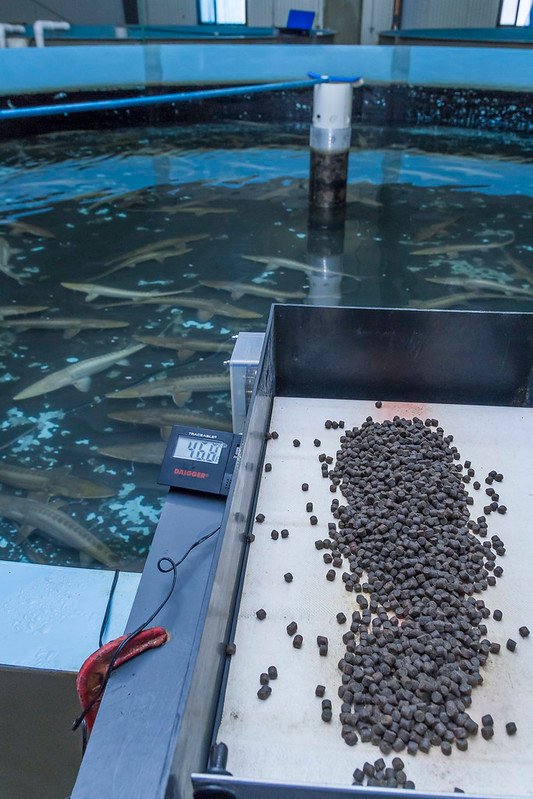
The Nile tilapia is an important fish species in the aquaculture industry, but optimizing its initial growth is crucial for efficient production.
Recent research by scientists from the National Institute of Oceanography and Fisheries (NIOF) has explored the potential of chitosan nanoparticles (CsNP) as a nutritional stimulus for Nile tilapia fry. This article delves into a scientific study that investigated the impact of CsNP on the growth, health, and intestinal development of Nile tilapia fry.
Nutritional programming in early life stages
Recent research highlights the importance of nutritional programming in the early life stages of fish. During these life stages, especially larvae, they are highly sensitive to dietary influences. By providing specific nutritional support during this critical period, we can positively impact their metabolic processes throughout their lives.
What are chitosan nanoparticles?
Chitosan is a natural molecule derived from chitin, found in the shells of crustaceans. When processed into nanoparticles, chitosan offers unique properties.
These nanoparticles have gained great interest due to their unique properties, including:
- Enhanced delivery: These small particles have a large surface area, making them highly efficient carriers of nutrients and bioactive compounds.
- Improved absorption: CsNP can potentially increase the absorption of essential nutrients in the intestine.
- Biocompatibility: They are generally considered safe for use in food applications.
Optimizing CsNP supplementation
Previous research has demonstrated the potential of chitosan nanoparticles to improve the immunity of tilapia fry; however, while the potential of CsNP is evident, further research is needed to:
- Refine dosage: Identify the optimal concentration of CsNP in tilapia fry diets to obtain maximum benefit while maintaining safety.
- Long-term effects: Evaluate the long-term impacts of CsNP supplementation on fish health and product quality.
- Mechanism of action: Unravel the specific mechanisms by which CsNP enhances the growth and overall health of Nile tilapia fry.
Benefits of CsNP for Nile tilapia fry
The study examined the effects of incorporating different concentrations of CsNP (ranging from 0.05 to 1.6 g per kg of diet) in the feeding of Nile tilapia fry. The results were promising:
- Improved growth performance: Diets fed to fry containing 0.1 and 0.2 g/kg of CsNP showed significantly higher final weight, weight gain, and specific growth rate compared to the control group.
- Enhanced feed efficiency: Fish fed diets supplemented with CsNP exhibited better feed utilization, indicated by a higher energy efficiency ratio.
- Increased survival rate: Adding CsNP to the diet resulted in a higher survival rate among fry.
- Improved intestinal health: Intestinal examination revealed increased villi height in fish fed diets supplemented with CsNP, suggesting better nutrient absorption.
- Healthy liver function: Liver analysis showed a normal hepatocyte structure in fish fed with the optimal dose of CsNP (0.2 g/kg), indicating no adverse effects on liver health.
Optimal dosage
The study identified a specific dose (0.2 g/kg) of CsNP as the most effective in promoting growth and overall health of Nile tilapia fry. This level resulted in improved intestinal health, with no adverse effects on the liver.
Promising potential for Nile tilapia aquaculture
The findings of this study suggest that chitosan nanoparticles have the potential to be a valuable tool in Nile tilapia aquaculture. By promoting growth, improving feed efficiency, and supporting intestinal health, CsNP could contribute to:
Stay Always Informed
Join our communities to instantly receive the most important news, reports, and analysis from the aquaculture industry.
- Increased tilapia production: Faster-growing fish translate to higher yields, leading to a more sustainable food source.
- Reduced production costs: Improved feed efficiency can lead to lower feeding costs for fish farmers.
- Enhanced fish health: Supporting healthy intestinal and liver function can contribute to overall fish health and disease resistance.
Conclusion
These findings suggest that CsNP is highly promising as a nutritional supplement for Nile tilapia aquaculture. Further research is needed to explore the long-term effects and potential mechanisms by which CsNP enhances tilapia growth and health. However, this study paves the way for the development of novel and sustainable food additives to enhance efficiency and productivity in tilapia farming.
Contact
Ahmed M. Aboseif
National Institute of Oceanography and Fisheries, (NIOF)
Email: Ahmed.Aboseaf@gmail.com
Reference (open access)
Aboseif Ahmed M., Marwa M. Zaher, Enas A. Ramadan, Nevine M. Abou Shabana, Mostafa K.S. Taha, Hany M. Nazmi, Suzan H. Fadda, Ashraf M. A-S. Goda. Chitosan Nanoparticles as Nutritional Stimulus in the Early Feeding of the Nile Tilapia Fry (Oreochromis niloticus). Egyptian Journal of Aquatic Biology and Fisheries, 2024; 28(2): 83-112. doi: 10.21608/ejabf.2024.345885
Editor at the digital magazine AquaHoy. He holds a degree in Aquaculture Biology from the National University of Santa (UNS) and a Master’s degree in Science and Innovation Management from the Polytechnic University of Valencia, with postgraduate diplomas in Business Innovation and Innovation Management. He possesses extensive experience in the aquaculture and fisheries sector, having led the Fisheries Innovation Unit of the National Program for Innovation in Fisheries and Aquaculture (PNIPA). He has served as a senior consultant in technology watch, an innovation project formulator and advisor, and a lecturer at UNS. He is a member of the Peruvian College of Biologists and was recognized by the World Aquaculture Society (WAS) in 2016 for his contribution to aquaculture.







